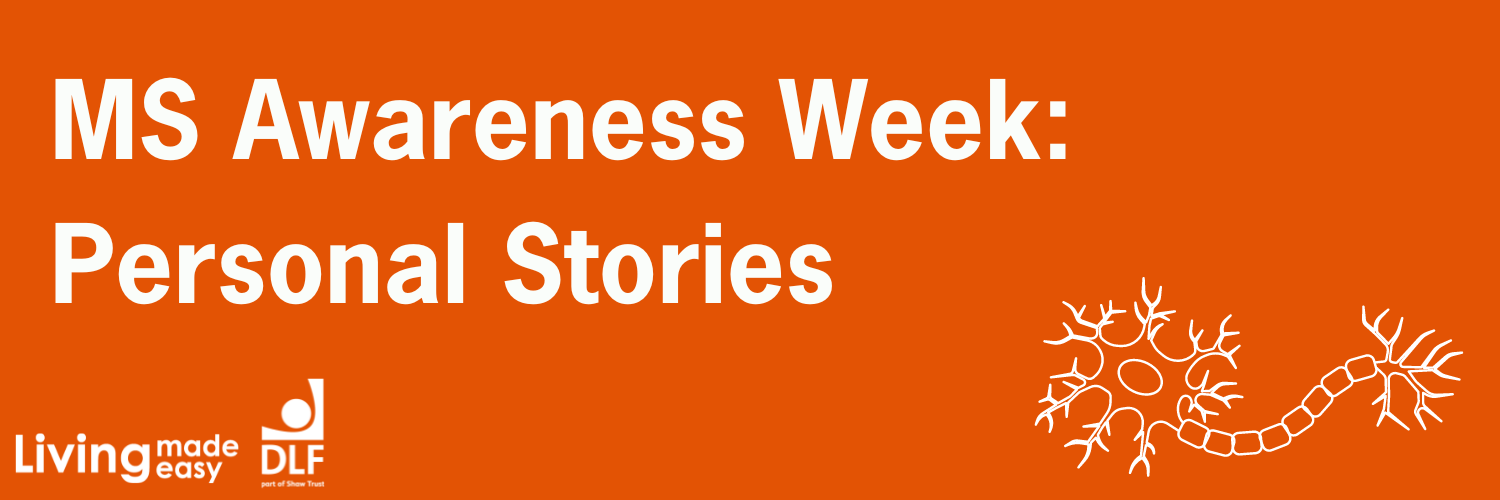MS Awareness Week: Personal Stories

This week has been MS Awareness Week, a week dedicated to raising awareness about Multiple Sclerosis.
MS is a condition that affects over 131,000 people in the UK today. It is a complicated condition that impacts every part of a person's life. Multiple Sclerosis (MS) is a condition that affects the brain and spinal chord, causing a wide range of symptoms. These can include, but are not limited to, problems with one's vision, arm or leg movement, sensation or balance. It can cause problems with bladder control, muscle stiffness and spasms, fatigue and more. Depending on the type of MS a person has, (relapsing / remitting, or primary progressive) the symptoms will either come and go, or steadily get worse over time.
MS is an autoimmune condition. In MS, one's immune system attacks the layer that surrounds and protects the nerves. This is called the myelin sheath. This means that the nerves aren't protected, so they become damaged and scared. Because of this the messages that travel along the nerves become slowed or disrupted. Although there is no cure, medications and various other treatments can help control the condition and ease the symptoms.
Personal Stories
In order to properly understand the impact of MS, we talked to someone living with the condition so that they could share their personal story.
Hayley is a 50 year old mental health nurse, and “very nearly qualified councillor”. She has bright red hair and a kind smile, and has been working for Shaw Trust as an Occupational Health Practitioner since December 2022. She has a 12 year old daughter who she often talks about with a laugh when discussing the typical mother daughter highs and lows of teenage life.
In 2007 she had been having bouts of vertigo, and numbness on one side of her face. She'd also been living with numbness from the waist down. At first the doctors suspected Bell's Palsy. Bell's Palsy is a temporary weakness, or lack of movement that effects one side of the face. Most people will recover within 9 months. However, this did not explain the numbness from the waist down that she experienced for six months, which then vanished.
Hayley describes her diagnosis journey as abrupt, and leaving her feeling adrift.
It was strange really. i went to the GP again, and he just said “I think you have MS Hayley.” And then kind of sent me on my way. I had an MRI and this came back that I had the tell tail scaring on the brain, which showed it was indeed MS. So, in answer, it only took a few months from the GP saying, to having the MRI, but it was years that I had been having symptoms."
Though life is undeniably difficult, it's not all doom and gloom. Hayley says that living with MS has made her learn a lot about herself.
I am very strong willed which is a good thing. But also, I push myself too much when I'm having a good day."
And she's learning all the time, not only how to do things differently but how to manage herself during the days, whether it's a good day or a bad.
One day I'll learn to pace myself.
For those who are newly diagnosed, Hayley has her own hints and tips.
Everyone experiences MS that is unique to them. Find out about it, listen to your body. It will tell you what it needs. Talk about it. Get support from the MS Society. There are brilliant support groups out there who are fantastic too.
What can help day to day?
Hayley encourages people not to be afraid of using assistive technology, or daily living aids. There are many items out there that are designed for all kinds of disabilities with a mind to making simple tasks easier for those who struggle. This could be anything as complex as a wheelchair to a simple button hook.
Hayley uses a walking stick. This helps her slow down and walk in a straight line, both of which prevent her from losing her balance when out and about. Balance is a difficulty a lot of people with MS have. Difficulty walking can be caused by muscle weakness, stiffness, foot drop amongst other things. Using a walking stick can help with all of these difficulties.
She also uses a shower stool to prevent falls in the bathroom. Shower stools are useful not just if one has poor balance and is worried about slipping on the wet surfaces, but also for the fatigue caused by MS.
A shower stool isn't the only kind of stool that can help. Perching stools can be used anywhere in the house, especially in places like the kitchen where you might have to stand for a long period of time to finish tasks like cooking or washing up. Hayley uses a perching stool in the kitchen so that even when she is feeling fatigue, she can feel productive.
We hope that you have found this article on MS, and Hayley's words insightful and helpful.
If you want any more information about any of the products mentioned in this article, click on the bold and underlined text.
For more information about MS visit any of the following resources